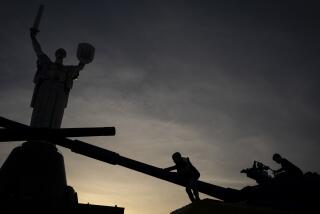PERSPECTIVE ON RUSSIA : It’s Not as Bad as We Say It Is : Inflation is down, the young are optimistic, the military is in decline and and the ruling class won’t jeopardize its gains.
- Share via
The U.S. media have delivered bad news about Russia for years. Recently, there have been Boris Yeltsin’s second heart attack with rumors of the president’s impending demise and a possible power struggle to succeed him; the Russian military’s increasing involvement in politics; crime, corruption and economic travails; a more conservative Russian legislature possibly emerging from Sunday’s Duma elections, which could signal a surge in neoimperialist policies abroad and even a new Cold War or open conflict with the West.
Is Russia really a catastrophe about to happen? Hardly. First, Yeltsin’s death, however likely or unlikely, will not lead to an uncontrollable power struggle in Moscow. If any good came of the violent dissolution of the Supreme Soviet in October 1993, it was the realization among Russia’s political elites that they had to abide by certain rules of the game. Hence, despite deep and intense disagreements between the executive and legislative branches in the last two years, leaders from both sides have actually engaged in a repetitive process of give-and-take that is at the heart of any democratizing system.
Among the current lineup of Russian political forces, no one has the appetite for blood. Those who are most openly aggressive have been left on the political margins; in fact, extreme nationalists have lost repeatedly in elections in 1989, 1990 and 1993. The exception has been Vladimir Zhirinovsky, but his behavior since becoming a member of the Duma has been closer to the restrained line of the Yeltsin government than to his own intemperate rantings about Russian soldiers washing their boots in the Indian Ocean. In the case of Yeltsin’s demise, a peaceful, constitutional transfer of power to Prime Minister Viktor Chernomyrdin will likely transpire, to be followed by elections.
Second, there is no indication that the military will soon be wresting the reins of government from civilians. The Russian army did not cooperate in the August 1991 coup; only very reluctantly allowed itself to be drawn into the violent political struggle of October 1993, and was severely divided on going to war in Chechnya. Despite acute institutional problems, the top brass continue to adhere to a high level of military professionalism. Even Gen. Alexander Lebed, the most prominent of the soldiers-turned-politicians, resigned his commission before entering politics. All indicators including manpower, money, technology, training, logistics capacities and readiness point to decline in the Russian army. Officers are more likely to be “hunting and gathering” for their needs than planning coups in the foreseeable future.
Third, despite ongoing pain caused by market transition, there has been no massive economic catastrophe in Russia. Regions like Perm, Cheliabinsk and Ekaterinburg, projected to be hit hardest because of their former dependence on the Soviet military-industrial complex, are relatively prosperous. Inflation is down from 18% in January to 4.7%, thus allowing Russians to purchase more with their incomes. Foreign investment in the first half of 1995 was 25% more than the same period in 1994, and the Organization for Economic Cooperation and Development recently reported that the Russian economy may grow as much as 10% in 1996.
Fourth and more important than numerical indicators, attitudes have changed among Russians. Despite crime and economic difficulties, many people feel confident about Russia’s future. Some members of the younger generation want to have two or more children, which was virtually unheard of in Soviet days, and fewer of the best and brightest see emigration as the path to success. New, slick magazines like Matador (a fashion magazine like Vogue) and Domovoi (a la Good Housekeeping) reflect the interests of a growing middle and upper-middle class. These people, politicians included, have tasted the good life and are not about to jeopardize their aspirations by supporting reckless, neoimperialist policies.
Dire predictions about Russian catastrophes may be rooted less in reality than in old habits. But Russians are muddling through with considerable competence and success in their many post-Soviet challenges, Now it is time that we stop listening to the trumpeters of doom. Let the good news be heard: All is (relatively) well in Russia.
More to Read
Sign up for Essential California
The most important California stories and recommendations in your inbox every morning.
You may occasionally receive promotional content from the Los Angeles Times.













